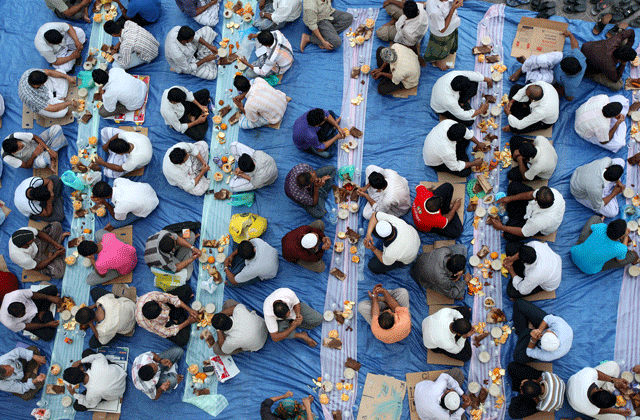
DUBAI
It’s 7.05pm on Tuesday in the middle of a sweltering Dubai evening. The narrow roads around Ali Rashid Lootah Mosque in the old part of the city are quiet –- except for the muezzin’s call to prayers.
It’s near the end of a 15-hour Ramadan fast. The footpaths around the mosque are packed with up to 5,000 people -- quiet, almost contemplative.
It’s a sight to behold for anyone setting foot for the first time on this area at this time.
Volunteers gladly usher anyone to find a place to sit and share a meal with perfect strangers.
The preparations start about half-a-day earlier, when up to 15 people prepare the meals in a Sonapur kitchen before loading them onto a dozen custom-made food containers and unloaded from trucks by forklifts near the mosque.
By around 7pm, men from all walks of life -- shop owners, business executives and labourers –- sit legs crossed atop a blue tarpaulin on brick-covered alleys.
It is arguably the city’s biggest Iftar (end-of-fast) served in one place. After the muezzin’s prayer ends, the meal begins.
“Everyone is welcome here. It is not as much about the food, as it is about the spirit of community. We don’t ask where a person comes from, or his skin colour or his job. These differences don’t matter,” said businessman A. Liyakath Ali, 57, general secretary of the Indian Muslim Association (Iman).
His group first started the nightly Ramadan banquet with 50 meals in what used to be the much smaller Kuwaiti Mosque in 1976.
In its place now stands the much bigger Lootah Mosque, a major landmark in Community No. 133, just behind the world-famous Gold Souq and a few minutes’ walk from the Al Ras Metro Station.
The Iftar, a light meal, is rather modest but enough to break the dawn-to-dusk fast. Khanji (known as “liquid biryani”) is served warm. Each one also gets a packet of samosas, oranges, dates, juice and water.
“We try to find a place for everyone who comes here,” said A. Mohammed Al Thaha, also an association volunteer. “Generous people here donate the meals.”
Businessmen and shop-owners eat with their bare hands alongside ordinary labourers.
“There’s no rich or poor here,” said Mohaideen Abdul Khader, a 40 year-old business development manager of a European company in Dubai. The crowd swells to about 7,000 towards the end of Ramadan, said the volunteers.
After the iftar, worshippers go for Maghreb prayers. A volunteer offers Miswak at the mosque’s entrance. Then the bright lights in nearby shops flicker.
Shiny European luxury cars mingle with cart wheels laden with textile drawn by men wearing sharwal khamees on its narrow one-way streets. Another Ramadan night springs to life.


